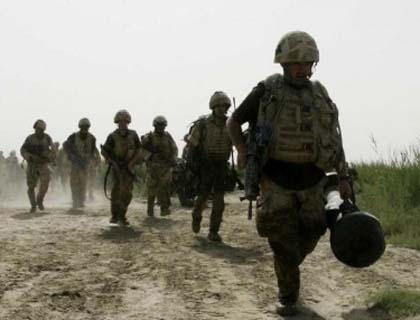Exactly two years ago, during same days, Iraqi government and people breathed in relief as the last caravan of US troops left the country on Dec. 18, 2011. All propaganda against US such as ‘it toppled the regime of Saddam Hussein for energy’ and ‘it will not leave Iraq at any cost’ vanished. But President Obama decided to remain committed to bilateral agreement made between the two countries; it pulled out all its security forces from Iraq and allowed some of its rival to become important players. Corresponding to closing deadline for military withdrawal and continuance of negotiation between Baghdad and Washington officials, both Shia and Sunni sects joined hand to oppose US military presence. Dominated Shia cities saw spectacular anti-US demonstration from conservative and radical fronts. Similarly, Sunni’s radical sect from the very start of US military invasion took arm against it.
Hence, while Iraqi children were throwing stones towards last caravan of US military, Iraqi adults were smiling and were happy. Somehow the withdrawal was supported both by government and people irrespective of their political tendency or communal linkage. Officials were also ensuring people that Iraqi government had become enough strong to protect the country and there was no need of further US military presence.
Unfortunately, such initial happiness did not last long. It was vanished as propaganda about long US military presence in the country. Earlier concerns about the consequence of US military withdrawal became actual. Despite holding an acceptable parliamentary election where all fronts unanimously took part, the government has changed into a battlefield of sectarian tension.
One of the vital characteristics of the previous election, of course, was the overwhelming participation of minority Sunni, who boycotted the previous 2005 parliamentary election and the country was sharply divided on the sectarian base. The ubiquitous enthusiasm among Iraqis and their courageous participation in the voting procedure, despite several warnings issued by militants, sparked hopes among international observers that Iraq could not be perverted and would move on the irreversible path of liberty and democracy. But that optimism did not last much as different political parties have been indulged in irreconcilable brawl on the power sharing.
The incessant sectarian violence that has grasped the country and left thousands of death reflect that government has failed to fulfill its promises in terms of peace and stability.
On Dec. 22, Prime Minister, Mr. Nouri Al-Maliki, also warned Sunni protestors in Anbar city to stop harboring al-Qaeda linked individuals in their protest camp. He warned to wipe them up. Subsequently, Iraqi security forces clashed with protestors which left casualties. Since then, security forces are in full-fledged war with Sunni armed groups some of whom are linked to al-Qaeda. Armed militants has captured part of the two Sunni dominated cities, Romadi and Floja. The handover resignations of Sunni MPs have further complicated the situation. Previously, al-Qaeda were organizing suicide bombings on Shias, then a major part of Sunni community was simply condemning the attacks in order to prevent as sectarian violence. But seemingly, corresponding to the rise in tensions, gaps between two sects became larger. If Sunni influential leaders and officials do not take serious steps to motivate people to stay away from violence, the possibility of sectarian tragedy is on rise. Similarly, government should also listen to grievances of minorities and try to resolve them instead of strengthening pillars of its power through suppression or by clinched-fist.
Anyhow, the sectarian violence Iraq has a moral lesson for Afghanistan. I think Iraq can be a mirror for Afghanistan to see its future and avoid committing mistakes Baghdad did. Based on polls, slightly more than 51 percent of Americans supported zero military option from Iraq.
Many American civilians envy the economic development in countries like China, India, Brazil while observing the unbridled ascendance of unemployment and huge budget deficits. They want government to care much about domestic dilemmas rather than wasting billions of dollars on the infertile ground of Afghanistan and Iraq. President Obama figures out the anti-war domestic sensitivity and he never showed flexibility over the scheduled time for withdrawal.
However, it looks far likely that al-Qaeda can endanger the entire democratic projects of state-building and reverse the whole process because the democratic values certainly got strong, deep roots in the urban areas, but of course, the persistence of political uncertainty and lack of American combat forces in the ground would prove costly for country.
But the question remains that what US will do if the situation starts undoing? Some Analysts maintain that American officials have already showed much flexibility in different cases. The overwhelming opposition to prolong war in the country might mount on pressure on Pentagon officials to avoid bargaining with Afghan officials. Late last month, President Karzai talked with journalists about his persistence on not signing the Bilateral Security Agreement (BSA). Without expressing reasons, he ensured that US does not want to withdraw from the country due to its long strategic interests in the region. Therefore, he pressurizes US to help the country largely. But officials, particularly, President Karzai should notice that civilians’ opposition to Afghanistan war might put Washington to assess the zero military option. In such case, the Iraq scenario will be replayed in the country.

